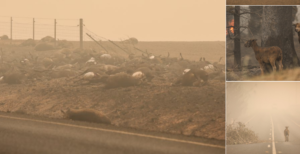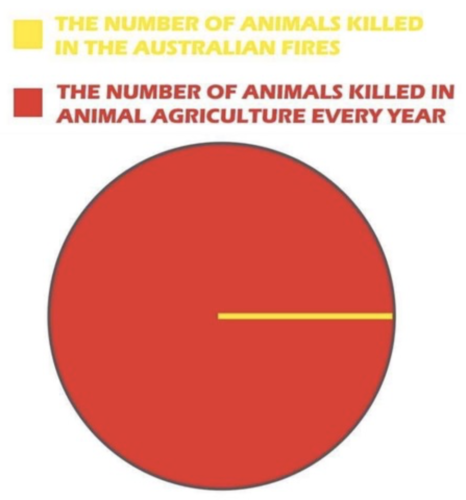
Matt Roberts@ABCcameramatt
Linda wrote in to “Contact Us” saying the numbers in my January 13th post, “National Geographic: How Many Animals are Affected by Australia’s Disaster? are much greater now.
She said that she lives in Canberra, Australia, where “the air pollution from the bushfires has been at 26 times the hazardous level.”
Thank you, Linda, for your thoughts.
Hi Kathleen, thank you for posting about the tragic animal deaths due to the Australian bushfires.
However, sadly, the estimate of 480 million you passed on has now been greatly exceeded.
It’s been widely reported that the number of animals who’ve been killed in the fires is now conservatively estimated to be more than one billion. And since the bush fires continue to rage, that number is increasing every day.
Linda included a link to this HuffPost, Jan. 6 article,
Number Of Animals Feared Dead In Australia’s Wildfires
Soars To Over 1 Billion
It’s also worth considering that more than this number is killed every single week throughout the world for meat, dairy and eggs—substances we don’t need in order to enjoy good health; that are the major cause of the leading diseases resulting in chronic illness and premature death; that are a major factor in driving environmental destruction and loss of biodiversity; the production of which contributes to mis-allocation of food resources and world hunger; and that involve inflicting untold misery on innocent sentient animals.
Where is the outpouring of grief and sorrow for these animals?
Why are equally-sentient farmed animals considered less important, less worthy of concern than koalas, kangaroos and other native animals?
This bias is known as ‘speciesism’ — arbitrarily ascribing a lesser moral value to some species compared to others, with humans considering themselves to have greater moral value compared to all other species, and thereby entitled to exploit them.
This is a prejudice based on morally-irrelevant criteria, essentially no different to other forms of prejudice and discrimination, such as sexism and racism.
In this case, the morally irrelevant criterion is species rather than skin colour or sexual characteristics.
Leading animal rights philosopher and advocate Professor Gary L. Francione has explained ‘speciesism’ in a nutshell:
“When it comes to the violation of basic human rights, we are absolutist.
“No one talks about making slavery, child molestation, rape etc. more ‘humane.’
“When it comes to the violation of the basic rights of animals, we talk about anything but absolutism and, instead focus on making the violation of those basic rights more ‘humane.’
“We treat the fundamental interests of humans and non-humans differently. That is what ‘speciesism’ is.”

On the subject of animals killed in the bush fires, here’s a recent Facebook comment from Professor Francione:
“The past twelve stories about the Australian fires that have appeared in my in-box all had pictures of, and talked primarily about, koalas.
“There is no doubt that koalas are adorable. But there are an estimated billion animals (at least) that have been killed by the fires, and many millions more affected.
“Most of those animals are not as appealing as the koala. For example, dunnarts, which may well go extinct, resemble rats, which many people do not find appealing at all.
“Whenever some environmental catastrophe occurs, there is a tendency to focus on the ‘appealing’ animals.
“The dunnart may not be as appealing as the koala but has no lesser moral value or importance to the ecoweb.
“The same holds true for any sentient victim of these fires.
“We tend to think in symbols about events like this and the symbols we choose are almost always the ones that matter most to us. So when we talk about extinction, we focus on the big cats, elephants, etc.
“But we are not the measure of value. And the fact that we think we are goes a long way to explain how we get into these messes to begin with.
“And P.S. (although it should go without saying): If you care about the animals in danger in Australia; if you want to save these animals, and you are not vegan, why not?
“There is no morally coherent distinction between the animals we love and those we eat. And the animals presently at risk from these fires are, in all probability, at risk because of global warming for which animal agriculture is the primary culprit.”
Thank you again, Linda, for writing in.
In a further note related to above, in a private reading with Archangel Gabrielle, May 2012 through Linda Dillon, she had this to say to me:
“The humans have always thought themselves a very exclusive group.
“Well, they are not!
“Each of you is unique and beautiful and precious, but exclusion has no place in Nova Earth, and certainly not in our realm.”
And Nelda sends along these related links:
https://www.goodnewsnetwork.
https://www.goodnewsnetwork.
https://www.goodnewsnetwork.
Please join with us daily,
sending Love to Australia,
8 Minutes @ 8 AM and/or PM

